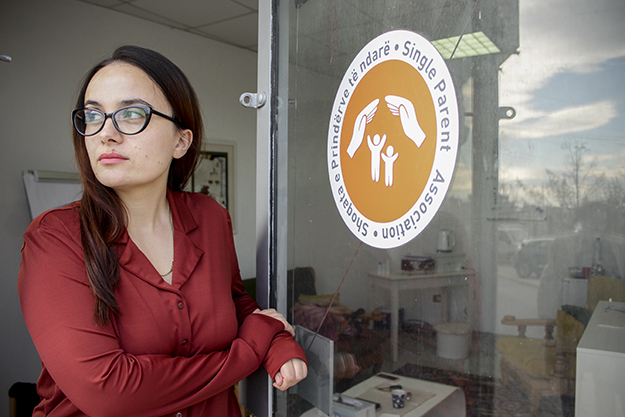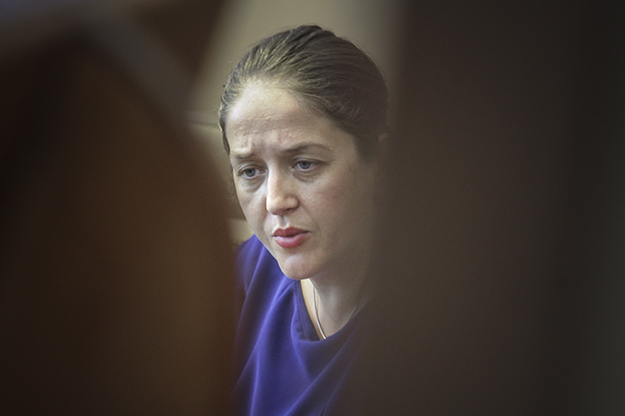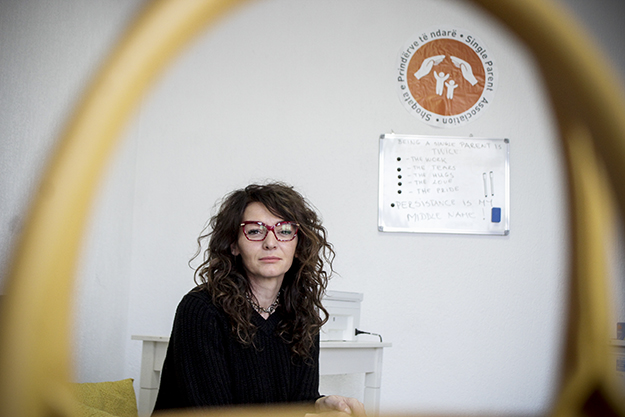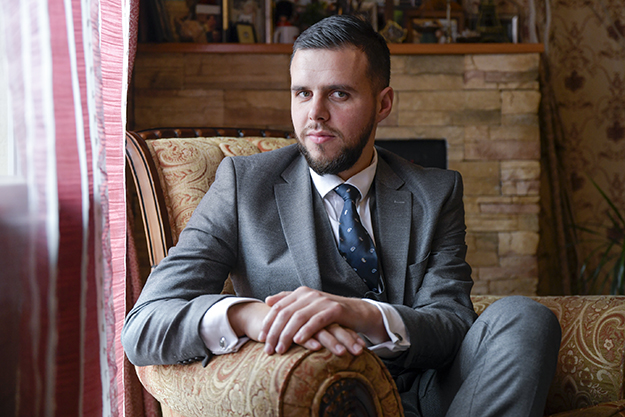Marigona Buja does not hesitate to call her former two story house in Lipjan a wrong address. She had lived there for over a year after her marriage, which was mediated between the two families in October 2014.
Only a few days after the wedding, she says that her role in her husband’s family was solely to serve. Indeed, the second floor bathroom was the only place where she could have any bit of privacy.
“That’s where I cried, where I sweared, where I cursed,” the 29-year-old from the village of Bujan in Lipjan says.
Marigona hurries to explain that the bedroom could not offer privacy because her father-in-law modified the door so that it opened from the outside even if it was locked.
She says that this control and supervision was set up by her ex-father-in-law in the absence of her husband, who lived between Kosovo and Germany, where the family conducted business. Yet, even when she would tell her husband about his father’s behavior, the only response she would get, according to her, was that “my father is the man of the house, I bow to him and to God.”
Marigona’s living situation with her in-laws began getting worse at the beginning of 2015 when she got pregnant. Marigona says that her ex-father-in-law’s behavior toward her turned even harsher when he learned that the child she was expecting was a girl.
“He would say ‘I am the man of this house, you are my servants.’ He used this type of reasoning,"
Marigona says about her ex-father-in-law
Marigona was ordered to be on her feet all day, attending to the housework of a five-person household — her in-laws, Marigona and her husband and her brother-in-law. She describes cleaning the inner walls of the yard and standing for hours on end after dinner as especially difficult moments during a single day in the house.
“He [her ex-father-in-law] would not let anybody go to sleep before he went, and I had to be on my feet all the time to pour him tea until he was done; often, I would have to stand until three or four in the morning — the whole family did,” she says. “He would say ‘I am the man of this house, you are my servants.’ He used this type of reasoning.”
She says that they prevented her from continuing school as a freshman at the Albanian Language and Literature Department of the University of Prishtina under the pretext that “you do not need school because you have everything here.” She was also not allowed to visit her parents without being accompanied by somebody from her ex-husband’s family.
She never felt at home in this house, perhaps because every action or behavior was ordered or controlled by the patriarch.

Marigona Buja filed for divorce one year after living with violent in-laws, while the confrontation with her ex-husband and his family continued in court. Photo: Agan Kosumi.
One of the most humiliating experiences she remembers was the act of submission through the custom of “taking hand” — an archaic ritual that is still practiced in some Kosovar families. The practice requires the new bride — in addition to waiting on her feet to serve her husband’s family — to greet his parents and guests, mostly women, by grasping their hand and moving it delicately up and down close to her face while bowing and looking down.
“I would have to take my in-laws’ hands every day,” she says, recalling that this lasted for weeks after the wedding. She gave in to this submission to avoid possible conflicts. “You know how things here are taken care of between men, and I didn’t want to cause trouble for my family.”
However, after her daughter was born, the situation got even worse when Marigona’s doctor recommended that she stay in bed for ten days. This medical necessity was ignored by her ex-father-in-law, who ordered her to carry out daily housework only three days after she gave birth.
It was during that time when Marigona’s family — her mother, father and brother — visited to congratulate their household. Yet, seeing their daughter in a difficult condition, serving guests soon after giving birth, the situation was aggravated and escalated into a verbal conflict and then physical quarrel between her ex-husband — who had come back from Germany after their daughter was born — and ex-father-in law with her family members.
Marigona says that she managed to get hold of her daughter and left with her parents.
Justice versus the patriarchy
In September 2015, Marigona returned to her parents’ home in Bujan, Lipjan where she lives to this day. That month, she reported her ex-father-in-law to the police for psychological violence and requested a restraining order, which was approved. She also sued him for harassment.
The Kosovo Criminal Code defines harassment as “whoever engages in a pattern of repeated and unwanted attention or communication with the intent to harass, intimidate, injure, damage property or kill another person or his or her children […] or whoever places another under surveillance with the intent to harass, intimidate, injure, damage property, or kill another person or his or her children […]”
She said that she dealt with these forms of violence — for which Marigona has taken her ex-father-in-law to court five years ago — on a daily basis during their one year of living together. However, she feels indignant about how slow her case has moved forward, saying that the defendant was often treated like a victim, despite her ex-father-in-law continuing to threaten her, especially in regards to her daughter.
According to data provided to K2.0 by the Kosovo Judicial Council, in 2019 there were 450 cases of marital disputes, 369 of which remain unresolved. Additionally, out of 553 divorce cases last year, 345 remain unresolved.
“I will not let her take my granddaughter even if it ends in a bloodbath,” Marigona reports her ex-father-in-law to have said in court, which, according to her, only prompted a laugh from the judge. “Isn’t this a threat?” Marigona says.
In spite of that, five years after leaving that house, the court in Lipjan sentenced her ex-father-in-law Q.S. to six months in prison for the punishable crime of harassment on September 21 of this year. According to media reports, the indictment issued by the Prosecution of Prishtina said that between October 2014 and August 2015, Q.S. had continuously communicated with the injured party in order to harass her, cursing at her and using insults.
However, with the consent of the defendant, the judge had announced that this sentence will be replaced with a fine of 2,000 euros, which released Marigona’s ex-father-in-law from imprisonment.
But the violent experience with the ex-father-in-law was just one of many other legal confrontations that Marigona would go through, which similarly happens to other women in such situations. Finalizing divorces, including disputes over the division of property, is usually what follows. And regardless of the nature or specifics of these cases, the justice system mostly applies a selective — often discriminatory — approach that ignores women’s experiences.
This is something that women’s rights organizations as well as many activists have criticized over the years. According to Luljeta Demolli, director of the Kosovo Center for Gender Studies, KCGS, the justice system often applies such an indifferent approach even in cases of divorce, where it protects rich husbands and makes sure that the wealth does not go to women.
“Violence, inheritance and the decision-making position are interconnected, because judges, too, espouse traditional norms on a personal level — because the patriarchy supports men, keeps them in power and within institutions,” Demolli says.
Although Kosovo has advanced legislation that guarantees equal freedoms and rights for women and men — including the Constitution, which also stipulates the application of international instruments such as the United Nations Convention for the Elimination of all Forms of Discrimination Against Women — institutional behavior is often governed by cultural values rooted in the patriarchy.
According to Demolli, the way that life at home is organized, although not as rigorous as it used to be, is embedded in the former system of patriarchal values regulated by the Kanun of Lek Dukagjini, which always placed the authority and power of the husband over the wife by depriving her of any choice or individual right.

Luljeta Demolli, director of the Kosovo Center for Gender Studies, says that traditional norms and customs engender exclusionary ideas and practices against women and their right to inheritance. Photo: Agan Kosumi.
For example, marriage according to the Kanun had to be done with an agreement between men or with mediators — similar to what happened in Marigona’s case — and that the marriage of the daughter had to be arranged by the father, brothers or cousins. The woman was generally perceived only for manual labor and childbirth. “To get married according to the Kanun means to start a household, to have more members for labor and to birth children,” the Kanun writes.
Demolli takes the example of the Kanun to illustrate how these norms and customs, some of which have been passed down through the generations, keep the woman at the sidelines of the household, and that within those walls everything belongs to the man.
In fact, something like this had happened to Marigona, too. Despite the fact that the Kosovo Family Law considers property acquired during the marriage through inheritance, donation or any other legal form of property acquisition as special property, when she left the house, Marigona was not allowed to take any of the things that belonged to her.
“They did not let me have the presents from my family, most of which were jewelry, gold, clothing and some other things,” she says. “Then I requested to take them back with a protection order, but my request was not approved, it was refused.”
Arjeta Gashi from Prishtina also had a similar experience with the division of property. She was denied any contribution from the houses where she had lived during the marriage, including seven years of living together with their in-laws in their house and then three years in the apartment registered in her husband’s name. Arjeta, who was married in 2003, divorced after 10 years of living with her husband.
“The house we lived in for the first seven years belongs to his parents, but after I got married, I threw all the old stuff away and replaced it. From teaspoons to lamps, I bought everything myself, everything. The bedroom, everything,” Arjeta says. “When I got married, my parents bought a lot of gifts, dishes, bedroom [furniture], a washing machine, a dishwasher, my son’s bedroom and many other things that were inside there belong to me.”
“I left the apartment only with the clothes I was wearing and my son,”
Arjeta says
Since her contributions were not compensated, in 2016 she sued her ex-husband L.Rr for denial of contribution. Despite the fact that the Law on Family says that the property acquired during the marriage is joint marital property, the Basic Court in Prishtina decided to reject Arjeta’s lawsuit request, after 11 hearings held between 2016 and 2018.
She even says that in addition to the contribution to the house of her ex-husband’s parents, she provided evidence in court of obtaining a loan for the purpose of furnishing the apartment, where she lived for the last three years of marriage with her ex-husband and son. According to Arjeta, she had invested 7,000 euros from this loan, but this evidence was not taken into account by the court.
“I left the apartment only with the clothes I was wearing and my son,” she says.
Arjeta requested the annulment of the first instance verdict, and the Court of Appeals sent the case for retrial. After the appeal, Arjeta continued with 11 more hearings, this time with another trial panel — which raised the number of hearings she had attended to a total of 22.
“The judges changed three times so far. The last judge disheartened me incredibly, she calculated my contribution as 10,000 euros and agreed with his [her ex-husband’s] accounting ,” Arjeta says. “I’m tired now, I’m sick of going to court once a month and it stresses me out.”
Following the final assessment, she filed another appeal with the Court of Appeals in November last year. But there is still no final decision.
“The people at the Court think I got a job there,” Arjeta says, explaining her long history of going from one court to the other.
In addition to her day job at the Electricity Transmission, System and Market Operator of Kosovo (KOSTTI) where she worked for 10 years, Arjeta, like Marigona, was also the one who took care of the housework on a daily basis as well raising her son.
And this care is counted as a contribution through the Family Law, which considers “the assistance of one spouse offered the other spouse, i.e. children’s care, conduct of housework, care and maintenance of property and any other form of work and cooperation pertaining to the administration, maintenance and increase of joint property” as a contribution.
Arjeta says that in her case, the court did not take into account this legal provision.
“I lived in [that] house for five years with two elderly people,” she says. “I did the housework on my own; [I took care of] the kitchen, the bathrooms, I did everything, my mother-in-law only helped me a little bit. But when it came to cleaning and cooking, I did everything. I did not have my husband’s support, not even for raising our son.”
According to a study by the Riinvest Institute, women like Arjeta who work in the private sector spend two or three additional hours on care and housework, which are not paid. Thus, women work 10 hours and 30 minutes on average in what is called a “double shift.”

After 10 years of marriage, first her ex-husband then the judicial system denied Arjeta her contributions to the house and apartment where she lived. Photo: Agan Kosumi.
Being a single mother and starting off from her experience, Arjeta established the Single Parent Association, which supports single mothers in their journey to protect their privacy, stability and continuous care for their children. This organization offers help for the well-being of parents and children who are involved in divorce proceedings by organizing meetings and giving professional legal counseling.
Arjeta says that one of the biggest challenges that these women face is shelter, as many of them leave their homes only with “whatever they’re wearing.”
“Many women deal with shelter issues, and many of them go to their parents or other relatives, but there are cases where they go back [to their husband’s house] because there is nowhere for them to go,” she says, having lived with her parents since 2013. “We have a case in Dragash where a woman went back to her husband’s house because, according to her, her husband promised to beat her less.”
Arjeta says that in the organization she established, there is only one case out of 100 where the husband left the house to the wife.
“They throw the other ones out like rags,” she says. “There are women in the organization who have asked me if they can sell their kidney to buy a house.”
As of August 2019, out of 164 disputes related to expulsion from houses or apartments in 2019, 152 of them remain unresolved according to the Kosovo Judicial Council.
Fatime* was also forced to leave the house where she lived for 33 years with her now deceased husband. However, unlike Arjeta, her departure from the house was not as a result of a legal process or pressure, but because the couple did not have children and thus left no heirs. This caused Fatime to be forced to abandon the house where she lived for over three decades.
She describes her inability to have children as painful and stressful — not because they lacked them, but, as she puts it, they dealt with a type of constant pressure from their close circle and friends.
“I sort of didn’t care that we didn’t have children, but when we noticed that people were seeing us as wretched because we didn’t have any, or when they would tell us ‘I hope God gives you a son,’ that was quite intense,” she says. “My husband would get very angry when he heard that from someone.”
During the years she lived in that house, which is located in an outlying village of the Rahovec municipality, Fatime dealt with all the housework.
“My body got worn out, the house had two and a half floors; I washed, cleaned, cooked and felt depressed,” she recalls. While she was not forced to do this labor by her husband, she sees it as a part of the societal expectations about women’s behavior and separate gender roles, saying, “this is how all women work.”
However, some time after celebrating their 33rd anniversary, Fatime’s husband passed away after battling severe illness, leaving her alone in the house, which she also eventually left a few days later.
“As soon as my husband’s wake was over, his brothers came and told me, ‘Fatime, how are you going to do this?’” she remembers. “Meaning, when are you going to vacate the house and property.”
Although Fatime had an inkling that they would ask this of her from the beginning, it was a difficult experience for her to leave the house where she lived for 33 years.
“It was worse than when we left our home during the war. I forgot the sorrow I felt for my husband,” Fatime recalls. She was accompanied by her younger brothers, who also agreed that this house did not belong to her.
“I went to that village only once after I got married [again], and I passed by the house. My whole body shuddered,”
Fatime says
Fatime says that when her husband was alive, she often suggested selling their property in the village and buying a house in the city where they could move because, as she puts it “it would be easier to protect a property in the city.” But her husband did not agree with this proposition.
Although she married again and started a new family, Fatime says that it is impossible for her to forget her late husband, her house and their yard.
“I went to that village only once after I got married [again], and I passed by the house. My whole body shuddered,” she says. “It’s difficult for us women, it’s like you have no support at all without a man.”
‘The house’ — a woman’s place in the household
The rigid and stereotypical conceptions and expectations about how gender roles are divided further confine women within their houses and families. While the crux of activism is precisely to challenge these conceptions, their rigidity also remains one of the most difficult challenges towards gender justice.
Adelina Tërshani, a gender activist who works with the Kosovo Women’s Network (KWN), is especially critical toward the concept of how the household is understood in patriarchal societies such as that of Kosovo.
“The patriarchal society in its every step, at every moment, tries to keep women separated from the concept of the house — be it physically or emotionally,” Tërshani says. “The house is the last capital that a woman can imagine owning, be it even as their father’s or husband’s property. Young women are customarily told that ‘this is not your house, your house will be your husband’s.’ But even then the husband’s house is not theirs.”
According to her, housework and the way that a woman’s place in the house is conceived in Albanian culture is a primary pillar of the patriarchy.
Demolli from KCGS sees the issue with a similar eye, saying that everything from the way that houses are maintained in Kosovo, including their construction, is representative of the exclusion that they subject women to.
“Three floors for three brothers,” Demolli says, explaining how ordinary Albanian homes are built. “Floors belong to the men.”
“The living room for example has two couches — one of them is where the husband lies down, the chair is where the husband seats guests and the other couch is for children. Women remain on their feet, in the kitchen,"
Demolli says
Men’s ownership of the house is also obvious from their facades. Architect Arnisa Kryeziu says that one can find elements related to the power of men in architectural construction of houses in their outer appearance.
“An interesting phenomenon of residential psychology, which is especially present in rural areas, is the construction of three or four identical houses — symbolizing the male heirs of a family,” Kryeziu says.
She sees this power as similar to the organization within the house, where women are limited to the role of family organization and logistics within the kitchen, cleaning and caring for children.
Demolli goes along these lines when describing that, according to her, women are expected to work in the kitchen or lie down in the bedroom, relating the latter with expectations over women’s reproductive role. So very few spaces, if any at all, are foreseen for the comfort of women in the house.
“The living room for example has two couches — one of them is where the husband lies down, the armchair is where the husband seats guests and the other couch is for children and younger people in the family who sit there because they can watch the TV,” she says. “From the way that houses are built, women remain on their feet, in the kitchen. All there’s left is the dinner table and the bedroom. They’re practically either on foot or lying down.”
Demolli expands her argument with details that may be noticed in the aesthetic layout within a house.
“I see that large TVs are trendy now, because they are expensive and men usually decide [to buy them],” she says. “And that TV may cost as much as a car for a woman. They may not even have a car to go to work, but there’s a huge TV there, which is beneficial to the man, the person who dominates, because he decides.”
Thus, according to Demolli, we always find the Albanian man in the center of the room, sitting in front of the TV and deciding what channels should be watched.
‘The father’s house, the husband’s house’
Although women are guaranteed equal access to their right of inheritance at every legal instance, in Kosovo there is a traditional norm that allows men to regulate this issue and entitles them to ownership of the capital. The lack of wider societal recognition and acceptance that women also have the right to inherit property is something that is also being cultivated and instilled in the upbringing and education of children.
KGSC’s Demolli explains that in her experience, women in Kosovo are raised in families where boys are promised and guaranteed that everything belonging to the parents will be transferred to them, thus depriving girls from this right.
“Boys are sung lullabies, songs and stories like ‘sleep tight, all of this belongs to you,’ or ‘live, achieve things, work and get an education because all that we have is yours,’” Demolli says. “It is very painful for girls to hear these privileges being promised to boys.”
Iliriana Gashi, director of Women for Women — Kosova, an organization that has been working with women in the country for 15 years with the aim of supporting their economic independence, says that in the context of a Kosovar mentality, even women themselves believe that they are not entitled to property, since they have internalized the norm that property belongs to men.
“I have not heard of any language or culture where the expressions ‘the father’s house, the husband’s house’ are more common,” Gashi says, adding that the voluntary renunciation of family inheritance continues to keep women powerless and subordinate to their husbands. “[But] many women are forced to endure the oppression of their husbands because there’s nothing for them at their father’s either.”
Out of 240,000 residential buildings in Kosovo, 7,400 are under the ownership of women.
According to data by organizations that focus on women’s rights and gender equality, but also according to the USAID Property Rights Program, only 16 percent of property in Kosovo is registered to women, where they are included as owners of land, houses, apartments or other types of capital. Compared to other countries in the region, according to a study by EULEX, Kosovo has the lowest percentage of women who own real estate, tailing behind Bosnia and Herzegovina with 25 percent of its women owning real estate, Montenegro with about 30 percent, Albania with over 30 percent and Serbia with almost 40 percent.
Although there is not specific data about the number of houses registered to women, Demolli says that the figure of women in Kosovo whose houses are in their names does not exceed 3 percent. If this number is seen in the context of the latest data of the Kosovo Statistic Agency from 2011, when the latest census was conducted, the number of buildings with at least one resident in Kosovo in 2011 was about 248,000. So, that means that only 7,400 houses in Kosovo are owned by women.
Another form of registering property is the joint registration by married couples. According to data by the KGSC, only about 18 percent of properties are registered as such. In 2016, with the initiative of the Kosovo Cadastral Agency (KCA) and the Gender Equality Agency, the Kosovo government decided to approve the Administrative Instruction on Special Measures for Joint Immovable Property on Behalf of Both Spouses, according to which joint property is defined as wealth that is gained during a marriage and is registered and managed by both spouses and whose ownership cannot be changed without the consent of both spouses.
But according to the lawyer Asdren Bytyqi, who in the last four years has been engaged in cases of inheritance disputes, there are some procedures in evidencing the inheritance that are not in favor of gender equality. And this is not only seen in cases of divorce but also in cases of division of inheritance between sisters and brothers, which speaks of different ways that women are generally deprived of the right to property.
“The problem here is that in these situations, brothers declare as inheritors only those they agreed with,” he says. “For example, they declare that they are only five brothers but do not mention the sisters, because the inheritor is only filling out the form mechanically [about] who is an inheritor and the municipality does not have the mechanism to verify if the information they gave is correct. They tell them, ‘testify under oath’; and they testify because the consequences are not severe.”

According to lawyer Asdren Bytyqi, justice institutions have not created proper legal mechanisms to guarantee women’s right to property — be it for inheritance or for the recognition of contributions during marriage. Photo: Atdhe Mulla / K2.0.
According to Bytyqi, despite the fact that the false declaration of heirs is a criminal offense, the consequences are often just fines. He mentions a case where he represented a woman in a dispute over a wealth of about 7 million euros, whose brothers had manipulated and hidden it from the declaration of heirs, and who the court had fined only 1,000 euros.
“I think this is the best indicator of how discriminated against women are in our society,” he says.
Bytyqi says institutions should completely digitize the civil registry mechanism and install a system that automatically registers all testators, as this mechanical procedure is used to omit women and girls from inheritance.
“The state must protect women from the first stage of dealing with the civil registry bodies, because it has created a large gap in municipal bodies, through the lack of a digital and well-functioning system that automatically verifies all living legal heirs or the descendants of the deceased legal heir, of the testator,” he says.
The same is happening in cases of renunciation of property, which although regulated by the Kosovo Law on Inheritance, there is no mechanism to verify whether the will to renounce property is real or imposed. And Bytyqi says that, “in reality it is more forced than sincere.”
As for disputes after divorce, according to his experience, the biggest difficulties are in the physical division of property and common things or compensation for them, because the courts do not offer alternatives on how to compensate one property value with another value, and it is mostly men who have the advantage as in most cases the property is registered in their name.
“I had a case when the court rejected the claim of the plaintiff, the wife, because she claimed that the wealth in the house increased while they lived together because both worked and contributed to the renovation of the house,” Bytyqi says. “But when it came to the division of property, the husband brought documentation that this property is in the name of [his] father and the house is in the name of the father.”
Luljeta Aliu — activist and executive director of the NGO Inject – Initiative for Justice and Equality — is also dealing with a similar case; she lived in Switzerland for three years of her marriage before moving to Pristina in 2007 at her ex-husbands insistence.
The problems in her marriage began in 2011, when she realized that the 600 square meter house built in 2008 — the biggest contribution to the construction of it she says she gave herself — was registered as the property of her ex-husband Bekim Krasniqi’s father.

Luljeta Aliu has been challenging the legal system for four years, requesting recognition of her contributions and the right to the property from her marriage as well as proper institutional protection, which remains absent. Photo: Majlinda Hoxha / K2.0.
“We built the house, normally with an agreement that it would be in the name of both, nothing was signed but it was in good faith,” says Luljeta who had realized that the house was not in her or her husband’s name from a casual conversation in the family.
“It is in Tal’s [the father’s] name, so what,” she remembers her ex-husband saying, who had promised her that this issue would be resolved, but it did not.
After several years passed, living with her ex-husband had escalated into physical violence, and Luljeta in 2017 reported him to the police. However, police officers had refused to register her report. The refusal was also supported by other police bodies tasked with addressing the complaints, on the grounds that the plaintiff was not properly dressed on the day she presented herself to the police.
“I won’t accept leaving, that house is mine — it’s mine because it’s ours, it’s mine because my children were raised there,”
Luljeta says
Because of this, in June this year she filed a lawsuit for discrimination and compensation of non-pecuniary damage of 100,000 euros against the Ministry of Internal Affairs and five police officers. This case has not been closed yet.
But Luljeta has other cases in the courts — either as a plaintiff or as a defendant. Since 2017, she is in court proceedings with her ex-husband for economic violence and denial of property division; while at the same time she has been sued by her ex-father-in-law to vacate the house, as she continues to live with her two daughters in the same house that is in dispute.
“I won’t accept leaving, that house is mine — it’s mine because it’s ours, it’s mine because my children were raised there,” Luljeta says, however the case has yet to be solved by the court.
She expresses dissatisfaction with the trial panel in her case and the negligence with which, according to her, the case is being handled, and sees the judiciary as a system composed of men led by relics of a centuries old mentality that oppresses women.
Similar beliefs are also shared by Tërshani from KWN and Demolli from KCGS. According to them, a large number of judges in Kosovo do not divide property between their own daughters and sons. According to them, they do not even have the property in co-ownership with their wives, which can be considered as a premise that leads to rulings where it is easier for women to be deprived of the right to property.
Their argument is also supported by a 2019 BIRN study, which found that no court president in Kosovo owns joint property with his wife, and of the 1,304 female government representatives in Kosovo, only 35 share immovable capital with their spouses.
One of the most discussed cases in Kosovo where a woman has been denied her property rights is the case of Shyhrete Berisha, a survivor of the Suhareka Massacre, whose husband and four children were killed by Serbian police officers on March 26, 1999, leaving her as the only survivor of the family.
Women's demands for justice often face prejudice or stigmatization from relatives and society.
However, after the war, Shyhrete was challenged by her deceased husband’s family, who denied her entry to and inheritance of the house where she lived with her husband and their four children until the 1999 war. Shyhrete had initiated legal proceedings for this case in 2005. But immediately after the decision of the Basic Court of Prizren in 2017 to recognize her ownership of half the house, the brothers of her ex-husband appealed to the Court of Appeals. Since then the case remains unresolved.
While access to justice for many women in Kosovo remains a challenge, at least some have begun to object to social practices and law enforcement institutions, and their experiences are increasingly becoming part of the public debate. But their demands for justice often face prejudice or stigmatization from relatives and society.
Marigona is facing such circumstances. In the village where she lives with her parents, which has no more than 50 houses, she travels every day to Prishtina where she works in a private company. She has to deal with her staring neighbors, whose gaze she calls “audible.”
“When I jump off the bus, my family comes and picks me up, I don’t dare walk. Otherwise they stare at me on the way home. Some with prejudice, others with pity,” Marigona says. “I am one of the first women in the village who got a divorce and took her kid with her.”K
Feature image: Agan Kosumi.
*Editor’s note: Fatime is a false name that was used to protect the source’s privacy at her request.
This publication is part of the third cycle of the Human Rights Journalism Fellowship Program, supported by the European Union Office in Kosovo. The program is co-supported by the National Endowment for Democracy. This program is being implemented by Kosovo 2.0, in partnership with Kosovar Center for Gender Studies (KCGS), and Center for Equality and Liberty (CEL). Its contents are the sole responsibility of Kosovo 2.0 and do not necessarily reflect the views of the donors.











